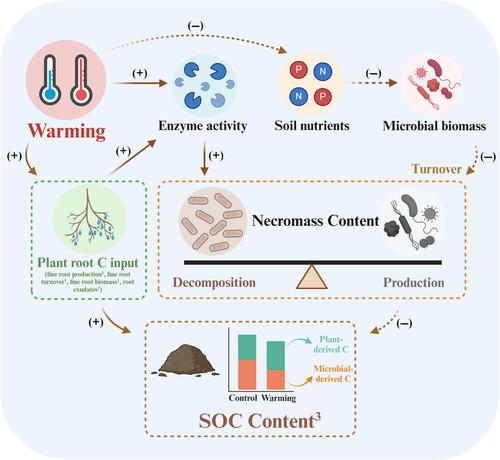当前位置:
X-MOL 学术
›
Glob. Change Biol.
›
论文详情
Our official English website, www.x-mol.net, welcomes your feedback! (Note: you will need to create a separate account there.)
Long‐term soil warming decreases soil microbial necromass carbon by adversely affecting its production and decomposition
Global Change Biology ( IF 10.8 ) Pub Date : 2024-06-21 , DOI: 10.1111/gcb.17379 Xiaofei Liu 1, 2, 3 , Ye Tian 1 , Jakob Heinzle 4 , Erika Salas 1 , Steve Kwatcho‐Kengdo 5 , Werner Borken 5 , Andreas Schindlbacher 4 , Wolfgang Wanek 1
Global Change Biology ( IF 10.8 ) Pub Date : 2024-06-21 , DOI: 10.1111/gcb.17379 Xiaofei Liu 1, 2, 3 , Ye Tian 1 , Jakob Heinzle 4 , Erika Salas 1 , Steve Kwatcho‐Kengdo 5 , Werner Borken 5 , Andreas Schindlbacher 4 , Wolfgang Wanek 1
Affiliation

|
Microbial necromass carbon (MNC) accounts for a large fraction of soil organic carbon (SOC) in terrestrial ecosystems. Yet our understanding of the fate of this large carbon pool under long‐term warming is uncertain. Here, we show that 14 years of soil warming (+4°C) in a temperate forest resulted in a reduction in MNC by 11% (0–10 cm) and 33% (10–20 cm). Warming caused a decrease in the content of MNC due to a decline in microbial biomass carbon and reduced microbial carbon use efficiency. This reduction was primarily caused by warming‐induced limitations in available soil phosphorus, which, in turn, constrained the production of microbial biomass. Conversely, warming increased the activity of soil extracellular enzymes, specifically N ‐acetylglucosaminidase and leucine aminopeptidase, which accelerated the decomposition of MNC. These findings collectively demonstrate that decoupling of MNC formation and decomposition underlie the observed MNC loss under climate warming, which could affect SOC content in temperate forest ecosystems more widespread.
中文翻译:

长期土壤变暖会对其生产和分解产生不利影响,从而减少土壤微生物坏死物碳
微生物坏死物碳(MNC)占陆地生态系统土壤有机碳(SOC)的很大一部分。然而,我们对长期变暖下这个巨大碳库的命运的理解尚不确定。在这里,我们表明,温带森林 14 年的土壤变暖(+4°C)导致 MNC 减少 11%(0-10 厘米)和 33%(10-20 厘米)。气候变暖导致微生物生物量碳下降,导致MNC含量减少,微生物碳利用效率降低。这种减少主要是由于变暖引起的土壤有效磷的限制造成的,这反过来又限制了微生物生物量的生产。相反,变暖增加了土壤细胞外酶的活性,特别是N-乙酰氨基葡萄糖苷酶和亮氨酸氨肽酶,从而加速了MNC的分解。这些发现共同表明,MNC 形成和分解的脱钩是气候变暖下观察到的 MNC 损失的基础,这可能会更广泛地影响温带森林生态系统中的 SOC 含量。
更新日期:2024-06-21
中文翻译:

长期土壤变暖会对其生产和分解产生不利影响,从而减少土壤微生物坏死物碳
微生物坏死物碳(MNC)占陆地生态系统土壤有机碳(SOC)的很大一部分。然而,我们对长期变暖下这个巨大碳库的命运的理解尚不确定。在这里,我们表明,温带森林 14 年的土壤变暖(+4°C)导致 MNC 减少 11%(0-10 厘米)和 33%(10-20 厘米)。气候变暖导致微生物生物量碳下降,导致MNC含量减少,微生物碳利用效率降低。这种减少主要是由于变暖引起的土壤有效磷的限制造成的,这反过来又限制了微生物生物量的生产。相反,变暖增加了土壤细胞外酶的活性,特别是N-乙酰氨基葡萄糖苷酶和亮氨酸氨肽酶,从而加速了MNC的分解。这些发现共同表明,MNC 形成和分解的脱钩是气候变暖下观察到的 MNC 损失的基础,这可能会更广泛地影响温带森林生态系统中的 SOC 含量。
















































 京公网安备 11010802027423号
京公网安备 11010802027423号